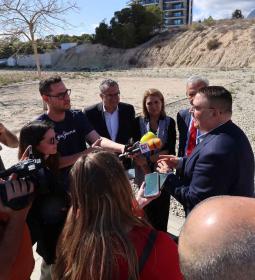The City Council has completed its environmental procedure and now it only needs the approval of the regional administration
Benidorm refers the project to restore and recover Racó de l’Infern quarry to the Ministry

<p>The project is promoted by Poniente sector developer, the merchant TM Grupo Inmobiliario</p>
Benidorm City Council has referred to the Department of Agriculture, Rural Development, Climatic Emergency and Ecological Transformation the project to restore and recover Racó de l’Infern quarry in its environment and landscape. The Councilor for Urbanism, Lourdes Caselles, explained that “the City Council has already completed the procedures for its competence and now it is the turn of the General Directorate of Natural Environment and Environmental Assessment to approve this project, presented and promoted by the developer of the Partial Plan 2/1 Poniente, the commercial company TM Grupo Inmobiliario ”.
As the councillor has detailed, the City Council processed and submitted the Environmental Impact Study to public information, so "at this time it is necessary to request the Ministry of the Environmental Impact Statement of the project." Caselles has indicated that "we hope that the Department will expedite this process to be able to begin as soon as possible the regeneration of this space, of just over 60,000 square meters located for the most part in Serra Gelada Natural Park." Specifically, the quarry is located behind the roundabout where London, Paris, Vienna and Oslo streets converge; with pedestrian access in front of the ‘Pepita Puchades’ Employment Center.
The person in charge of Urbanism has emphasized that “it is a space of high environmental value, since it is also classified as a Site of Community Interest (SCI) and a Special Protection Area for Birds (ZEPA)”; and she recalled that "the intention of the merchant is to restore this old mining hole to later give the land to the City Council."
As the mayor, Toni Pérez, and the director of Urbanism of TM, Cristóbal Ruiz, announced during the presentation of the project, the restoration will be carried out with inert waste from the leftovers of the earthworks carried out by the merchant in the urbanization of Poniente area, about 178,000 cubic meters. In this way, these surplus earth will be deposited in the old mining pit instead of being transported to a landfill, thus also helping to reduce the carbon footprint.
Broadly speaking, the project proposes to recover the profile of the mountain and recreate a Mediterranean forest, generating an ecosystem that favors a biodiversity of flora and fauna. By conserving part of the rock from the quarry, the life of the raptors in the area is favored and preserved.
Phases of the project
As already announced during the presentation, once authorization is obtained from the Ministry, the project will be executed in 9 months and four phases. In the first phase, it is intended to condition the current access to the quarry to allow the safe transit of the trucks that will transport the materials for the restoration. Next, the work area will be cleared and the invasive plants removed to begin the morphological restoration phase of the hole in the old quarry.
Once this phase is completed, the soil will be prepared for reforestation and a drainage network will be built to prevent dragging. Next, the revegetation will be carried out in two different areas: 1, which corresponds to the old quarry square; and 2, which coincides with the slopes resulting from the morphological restoration.This revegetation will be carried out with native trees and shrubs of which there are still specimens in the area such as pines, olive trees, carob trees, palm hearts, black hawthorn, mastic trees. and rosemary. In total, more than 2,500 trees and about 3,650 shrubs.
Sustainable Development Goals
This project is linked to the fulfillment of 4 SDGs: 11, ‘Sustainable cities and communities’; Goal 13, ‘Adopt urgent measures to combat climate change and its effects’, number 15, ‘Life of Terrestrial Ecosystems’; and 17 ‘Alliances to achieve the objectives’.




